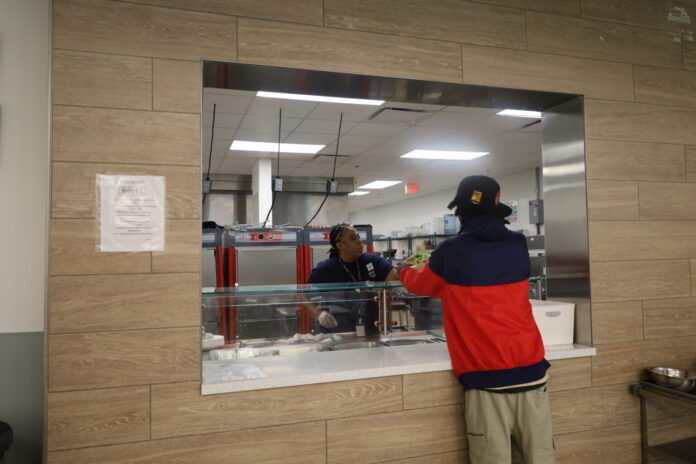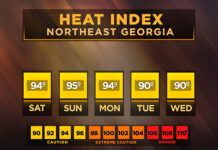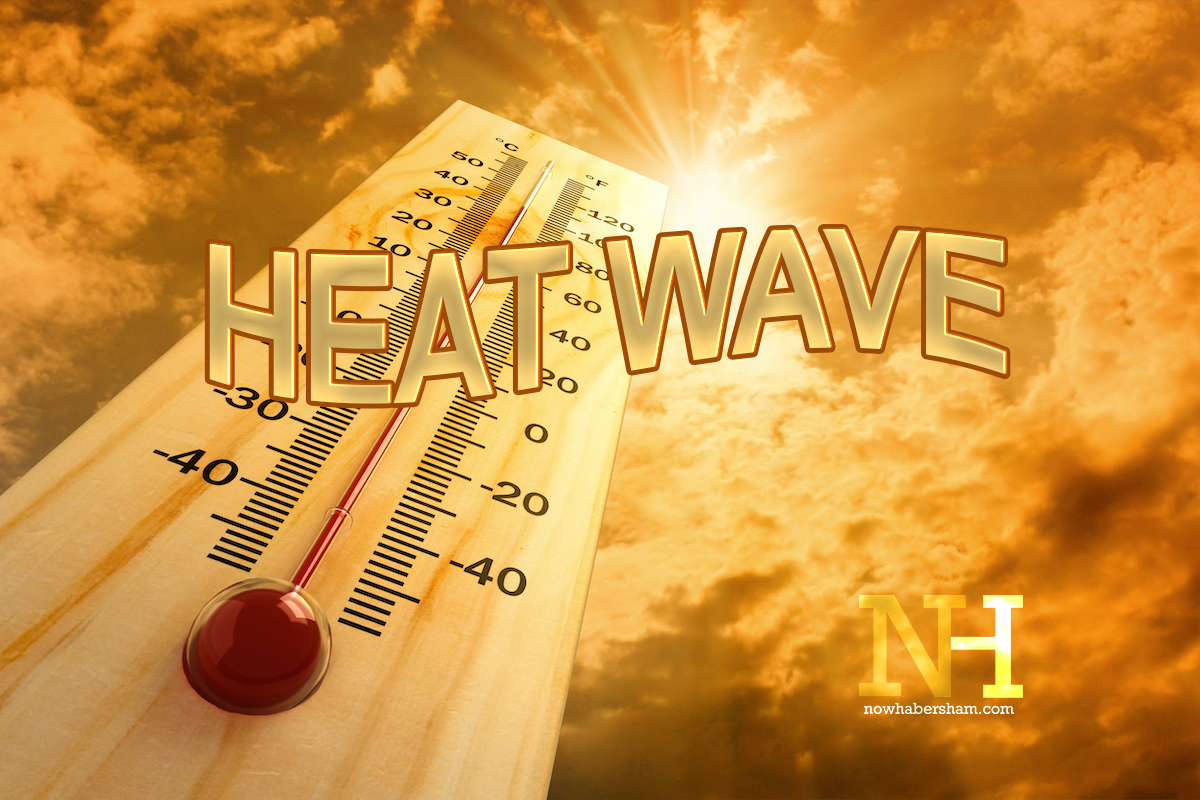
(Georgia Recorder) — While the Peach State is no stranger to high temperatures, this week was hotter than most. A National Weather Service heat advisory warned of high temperatures and humidity across the state.
“We basically have an area of high pressure over our area that is allowing these temperatures to be in place,” NWS Peachtree City meteorologist Carmen Hernandez said. “With high temperatures in the upper 90s, along with increased dew points, we are seeing heat indices in the 105 to 109 range.”
The heat index measures humidity and air temperature to more accurately represent what the temperature feels like to the human body, and it’s considered dangerous after reaching 105 degrees. Georgia reached these levels this week, causing a heat advisory to take effect Tuesday and stay in place for most of Georgia through Wednesday evening. The advisory extended through Thursday in the Northwest corner of the state, with some areas still feeling as hot as 105 degrees.
Traditionally, Georgia experiences a couple of heat waves each summer. Even with triple-digit heat indices, this week’s weather was not considered abnormal or concerning for weather experts. As the heat wave scorched the state, Atlanta’s NWS shared suggestions to stay cool. Top recommendations included minimizing exposure by staying inside or out of the sun, drinking extra fluids, and wearing light colored clothing.
Even with suggested coping mechanisms, dangerous exposure levels put some Georgians at higher risk. According to the NWS, vulnerable groups include the elderly, young children, pets and people who work outside.
While air conditioning remains one of the top recommendations to combat the heat, this is not a luxury afforded by all. Unsheltered populations face increased risk when exposed to high levels of heat. Cooling centers across metro Atlanta helped some avoid extended heat exposure. A Cobb County cooling center at Must Ministries’ Hope House has opened their doors every day this week.
“We operate whenever the temperature is above 90 degrees, and we provide lunch and dinner,” said Falecia Stewart, vice president of housing operations.
Last Friday was the first day of the season above this temperature. Traditionally, the Cobb County cooling center sees its busiest days during the month of July. On Tuesday, when the heat advisory began, the cooling center saw 25 people throughout the day. Visitors are welcomed between 9 A.M. and 6:30 P.M.
Outdoor safety
Employees who work outside or inside under harsh temperatures are also a high-risk group. According to the Natural Resources Defense Council, which is an environmental advocacy group, an estimated 1.8 million Georgians work in high-risk jobs that leave them vulnerable to heat-related illness. Farm, food processing, outdoor tourism and construction workers are some of the top occupations prone to heat related illness.
“Heat waves like the one the Southeast and most of the eastern U.S. in general have been facing over the last few days puts additional stress on not only outdoor workers, but indoor workers in hot conditions like kitchens or warehouses,” said Juanita Constible, NRDC senior advocate. “Along with the heat comes the risk of everything from mild heat related cramps and dehydration, to potential death from heatstroke or even cardiovascular illnesses that can be exacerbated by heat.”
Regular rest breaks, shade or air-conditioned spaces and staying hydrated remain the best options to protect people working through heat waves. Constible said she believes that companies with workers who face increased risks should have a written safety plan in place before a heat wave arrives.
Pet and livestock safety
A number of animal advocacy groups also echoed NWS’s warnings in hopes of spreading awareness on how to protect Georgia’s four-legged friends.
Unlike humans, dogs are unable to regulate their body temperatures by sweating. This makes them more susceptible to heat-related illnesses. Panting serves as an alternative allowing water to evaporate from their mouths in an attempt to cool down. However, panting can be insufficient in the level of heat currently encompassing the state.
Dr. Jaclyn Luckstone, president of the Georgia Veterinary Medical Association, recommends walking pets during cooler times to avoid risks.
“If you’re going to take them for a walk, check the pavement with your hand and feel how hot it is, because pets can easily burn their paws on it,” Luckstone said. “If you put your hand on the pavement, and you can’t leave it there for more than a few seconds, then it’s too hot for them to walk on.”
Claudine Wilkins has worked in the animal advocacy world for 37 years. As the executive director of The Animal Protection Society, as well as co-founder of the Georgia Pet Coalition, Wilkins regularly works to fight against animal cruelty.
“Georgia is well known to have lots of problems when it comes to summertime with animals and heat stroke,” Wilkins said.
With the exception of fish and most pests, animals are legally protected in Georgia. This means that leaving animals in hot vehicles can lead to a criminal charge. Wilkins urges bystanders to call local police for assistance if they encounter an animal trapped in a hot car during the heat wave or any warm day.
“Our habits stay the same, and we get used to our air-conditioned cars, houses and workplaces (so) we don’t think about the animals as much,” Wilkins said.
Georgia Agriculture Commissioner Tyler Harper also encouraged Georgians to look out for their pets and livestock.
“With extreme heat expected for the remainder of the week, I am encouraging all Georgians to take steps to protect their pets and livestock from heat stress,” Harper said. “GDA has resources available to help you identify signs of heat stress in your animals and how you can prevent it.”
Much of the East Coast and Midwest joined Georgia underneath a heat dome encompassing large parts of the country this week. As of Wednesday, The New York Times reported that Atlanta was one of 62 major cities with forecasts showing dangerous levels of heat.
After a long week of sweltering temperatures, Georgians can look forward to some relief with forecasts showing highs in the 80s through the entirety of next week.





